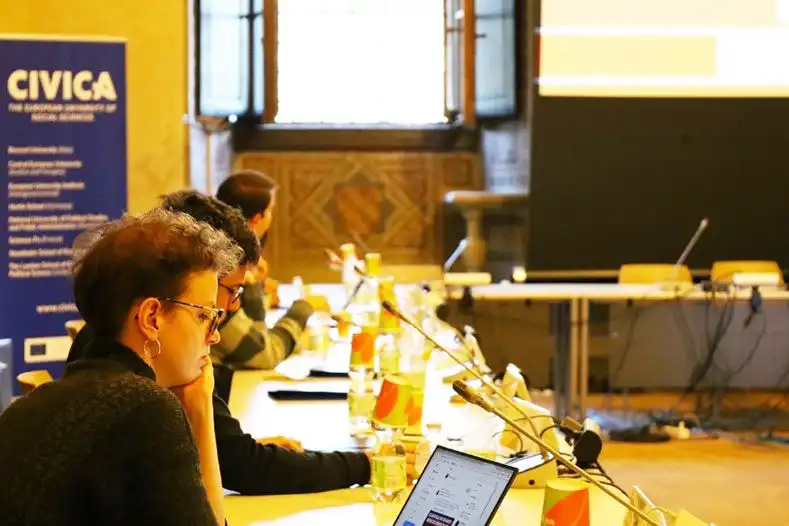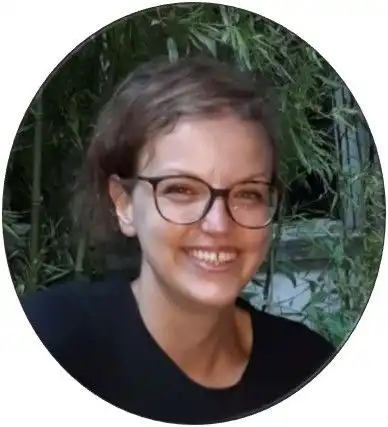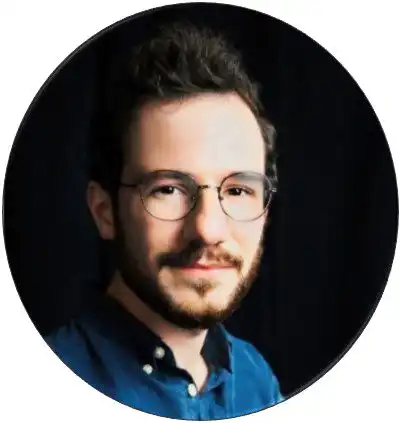Home>How to prepare yourself for the academic job market?
05.02.2022
How to prepare yourself for the academic job market?

In December 2021, EUI hosted the first CIVICA Research doctoral conference How to Prepare Yourself for the Academic Job Market, an event that allowed early stage researchers from CIVICA partner universities to come together and to benefit from cross-European expertise and best practices in academic professionalisation.
CIVICA Research brings together researchers from eight leading European universities in the social sciences to contribute knowledge and solutions to the world’s most pressing challenges. The project, co-funded by the EU’s Horizon 2020 research and innovation programme, aims to strengthen the research & innovation pillar of the European University alliance CIVICA.
A crucial step in better integrating research activities across CIVICA is the training of doctoral candidates, a goal addressed by CIVICA Research doctoral conferences. We spoke with Flavia CANESTRINI, Ph.D. candidate in History at Sciences Po, and Bastien CHARAUDEAU SANTOMAURO, PhD candidate in Migration Law at Sciences Po Law School, a Fox International Fellow at Yale University, and a Fellow of the French Collaborative Institute on Migrations (ICM), to find out how this first CIVICA Research doctoral conference helped them prepare for the academic market.
What are you currently researching and what has attracted you to this area of research?

Flavia: While working toward my M.A. in History, I became interested in the politics of international economic relations. After the First World War, sanctions emerged more systematically as an instrument of foreign policy to replace the use of military force. Its use has evolved over time, and its recourse has become more frequent, especially starting the 1970s and has only intensified since. I sought to better understand this process in its relationship to trade liberalization and globalization and how countries promoted both policies in an apparent paradoxical way.
My research seeks to better understand when and how economic and financial interactions became sources of leverage and power in international diplomacy. My dissertation is on the use of economic sanctions as a foreign policy tool in the Reagan administration.

Bastien: Since 2015, every week, hundreds of migrants—men, women, and children—attempt to cross the Alpine border between France and Italy, often with snow up to their knees. They are being pushed back by French border guards in apparent disregard for fundamental rights enshrined in French, European and international law. The Alpine line used to be an open border under the Schengen agreements, and people could freely cross from Italy to France. In fact, border checks are still proscribed by EU law. But the ‘temporary’ reintroduction of controls after the 2015 terrorist attacks in Paris gave place to a new border regime. This border regime is what I am looking at in my research from both an ethnographic and theoretical perspective, considering the following question: how is it, in a highly law-centric system, that a whole category of individuals is deprived of the rights they are a legally entitled to? In other words, through which daily legal concepts and operations is exclusion designed at the border?
Studying migration law is fascinating because it’s transnational, technical, and highly political thus directly connected to issues of global justice and ethics. It lies at the foundations of contemporary states and finely illustrate the ambivalent role of law in social struggles, individual rights, and state power.
How did you find out about the CIVICA Research Doctoral Conference and why did you apply for this event?
Flavia: I found out about the conference through the Sciences Po mailing list. I am currently revising my dissertation and starting to apply for the academic job market, so I thought the conference might be helpful to learn about how to approach this next step of my academic career. Bastien: I was notified of the CIVICA Doctoral Conference by Sciences Po’s School of Research newsletter. Being in the final stage of my PhD, I am aware that I should think ahead and start designing a way forward. CIVICA’s Doctoral Conference offered an opportunity to develop a set of relevant and necessary skills.
What did you appreciate about the format of this conference? Which activities did you find particularly relevant for your research career and why?
Flavia: Regarding the format, I appreciated the small, interdisciplinary, and diverse group of people attending it, which allowed me to interact with everyone and really exchange our thoughts on the academic job market. Before the beginning of the conference, we had the chance to share what we expected from it by proposing and then rating the topics we were interested to hear about. I particularly appreciated this collaborative side of the conference, with the organizer taking our interests and expectations into account before finalizing the program.
In particular, it was very helpful to have young professors come and share their own experiences in the academic job market by showing us their motivation letters or job talk presentations. It was extremely helpful in learning how to approach the job market and present ourselves and our research.
Bastien: Being engaged in interdisciplinary research, I truly appreciated the interdisciplinary and international character of the Conference. The fact that participants and speakers were from all CIVICA partner universities was a privilege in itself. The Conference was articulated around skill-oriented and down-to-earth workshops that addressed extremely practical aspects of building one’s academic career, including informal conventions and useful tricks to stand out in applications. Additionally, the balance between activities and informal times to exchange was ideal and allowed the participants to learn, relax and bond altogether.
Most activities were highly engaging and relevant. This stems from one feature they had in common: they were led by young but experienced scholars who underwent all sorts of selection processes not so long ago as (successful) applicants and were then part of selection committees. In other words, their experience and knowledge of application processes on both ends of the spectrum were very acute. I particularly enjoyed the sessions that incorporated live writing exercises (teaching statement and cover letters) and those with essential and concrete advice to stand out in an application (job interview and research statement).
How has the transnational character of the doctoral conference enriched your experience?
Flavia: The conference was important for improving my experience in academia beyond my research subfield by interacting with researchers from different backgrounds and nationalities. In particular, I had the chance to be part of this European academic network and learn about its research and grant opportunities.
Bastien: The transnational character of the Conference was influential in two ways. Firstly, discussing with other PhDs from all partner universities allowed us to take stock of the different experiences of doing research across European countries and disciplines. Secondly, having speakers with a similarly diverse background enlightened us as to how academia works in what one could call the transnational (and English-speaking) academic job market.
How did you interact/collaborate with fellow PhDs and academics from other CIVICA universities?
Flavia: I enjoyed getting to know people from different backgrounds but with whom I still share the experience of the Ph.D. We really took time to discuss about how to approach academia, the job market, and so on. The multidisciplinary environment was particularly stimulating.
Bastien: The multiple and recurrent coffee breaks and diners truly gave us the opportunity to bond, learn from each other and have a delightful time. Informal spaces like these are sometimes the most effective to spark interest and generate future collaboration.
One of the main goals of this event was to help doctoral researchers prepare for their future career. To what extent did you learn anything new about other academic job markets in Europe?
Flavia: Although we are all aware of how hard it is to find an academic job, we do not usually talk or share our thoughts about the realities of it. Most of the sessions in the conference were very pragmatic in discussing the challenges of the academic job market and giving valuable tips on how to improve our chances to succeed and find a job.
Bastien: I will highlight three learnings that I believe are valid for all job markets in Europe. The first is the need to create an identity as a researcher. This identity should be clear and public: what you are working on, what methods/disciplines you marshal and what the stakes of your research are. The second is the imperative to network. All in all, research is a collective undertaking. Thoughtful networking makes you identifiable and helps you understand, in due time, how a given department or research center operates. It’s also the premise to any sort of—sometimes unexpected—collaboration. The third is to learn how to explain your research project in simple terms, without specialized language. In many selection settings, committee members will not be specialized in your topic.
Finally, what would you say to peers who are considering similar CIVICA Research opportunities?
Flavia: I believe that it is important to take advantage of the opportunities that CIVICA offers. It represents a stimulating environment where to interact with other subjects, learn new things, think about new approaches to your own research, and grow as a scholar.
Bastien: Learn and practice how to present your research engagingly in a way the layman can understand. Don’t forget that, oftentimes, you are the most knowledgeable in your topic. Try to answer these questions in a concise and simple manner: What are you doing? How are you doing it? Why should we care about it?
Network, that is, foment meaningful relationships with peers and more experienced researchers. At the end of the day, academics are keen to work and hire people whose scientific identity they can relate to, and ideally, people they (indirectly) know they can trust. As one of our speakers said in relation to networking: “Doing outstanding research is not enough”, you must put yourself out there!
CIVICA is quite a unique venture and as we all know, the academic job market is challenging, to say the least: make the most of the opportunities you are given!
